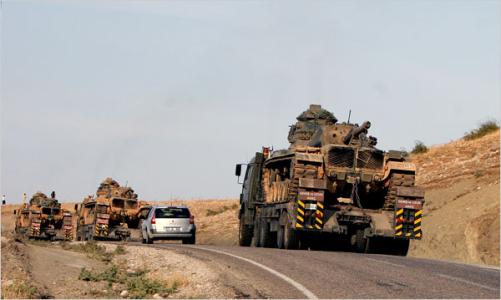After about three hours, through my night vision goggles I saw a pickup truck exiting the village.
大概三小时后,通过夜视镜我看到一个小卡车驶出了村庄。
This wasn’t all that unusual in itself, but the vehicle was traveling across the field, not on the road, with no lights on.
这本身并不奇怪,但是这个机车的灯是关着的,它没有在路上行驶,而是穿过田野过去的。
Naturally, this twitched my mental antennae. The vehicle was a little over a mile away and heading in our direction.
自然地,这触动了我的神经。这个机车在位于距我们一公里多一点的地方,正朝着我们的方向行进。
Over the intercom, I let the vehicle commander know that we had company incoming.
我在对讲机上告诉车辆指挥官有车辆开过来了。
He passed the word to the platoon sergeant, who passed it to the platoon leader, who was on the ground near the IED.
他将这一消息告诉副排长,而后副排长把消息告诉了排长,排长在靠近建议爆炸装置的地面上。
At about 1,500 meters, the order was given to me: "If they get within 300 meters, engage at your discretion."
在距我们大概1500米的时候,我接到了命令:“如果他们到了300米以内,自行决定行动。”
It was that simple. No warning shots, no flares, no second chances. Waiting for the vehicle to approach the 300-meter mark was the longest 15 minutes of my life.
命令非常简单。没有鸣枪警告,没有信号弹,没有第二次机会。等待那个机车靠近300米标记的时间是我人生中最漫长的15分钟。
"At your discretion" wasn't something I heard very often as a 21-year-old specialist.
对于一个21岁的特种兵来说,“自行决定”并不是经常能听到的话语。
I was being given the power of life and death over the occupants of that truck, and they didn't even know it.
我被赋予了决定那个卡车上的人们的生与死的权利,而且车上的人甚至都不知道。
My brain raced. Are these insurgents? What if they are doing farmwork in the middle of the night? (Not that uncommon in a desert country.)
我的大脑快速运转。这些人是叛乱分子吗?万一他们是半夜出来做农活的人呢?(这在沙漠国家并不罕见)。
What if they are driving off-road to avoid the insurgents and IEDs they fear may be on the road?
如果他们是在越野行驶,以避开他们担心路上可能有的叛乱分子和简易爆炸装置怎么办?
What if it's some guy taking a family member to the hospital? What if they are insurgents and the truck explodes when I shoot it?
如果那是某个家伙载着家人去往医院的车呢?如果他们是叛乱分子,在我开枪的时候卡车爆炸了怎么办?

Hopefully 300 meters is far enough away... But what played through my mind, over and over, was a lesson my father had taught me ten years before:
希望300米是足够远的地方,但是我脑海中反复播放的是父亲十年前给我上的一课:
When you pull the trigger, the consequences are yours—forever.
当你扣动扳机的时候,你将永远对它造成的后果负责。
When I was a boy in Sandwich, Massachusetts, I became interested in firearms and hunting and asked my father to take me shooting.
当我还是马萨诸塞州桑威奇市的一个男孩时,我对枪支和打猎产生了兴趣,并请父亲带我去打猎。
After some haggling with Mom, he agreed. I remember sitting down at the dining room table prior to heading to the range.
父亲和母亲争论了一番后,同意了我的请求。我记得去牧场之前,我坐在餐桌旁。
He had removed some rifles from the safe in the basement and instructed me on their proper handling.
父亲从地下室的保险柜里取出了一些步枪,并指导我正确使用。
After I gained his confidence, he fixed me with his loving, firm gaze and said, "I'm going to tell you something very simple but very important.
当我赢得父亲的信任后,他用充满爱意的坚定目光注视着我说:“我要告诉你一件非常简单但非常重要的事情。
You can't take a bullet back once you pull the trigger." I smiled and said, "Yeah, Dad, I know." He didn’t even blink.
一旦你扣动扳机,子弹就回不来了。”我笑着说,“好的,父亲,我知道了。”他甚至都没有眨眼。
"No, you don't. I mean this. You can't take a bullet back. Once you pull the trigger, it's forever.
“不,你不知道。我是认真的。你不能让子弹回来,一旦你扣动扳机,事情就已成定局。
It's not a movie; it's not a video game. No matter how many times you say 'I'm sorry,' 'It was an accident,' 'I didn't mean to,' that bullet Never. Comes. Back.
这不是电影,也不是游戏。不管你说多少次的“我很抱歉”,“那是一次意外”,“我不是故意的”,那颗子弹永远不会再回来了。
Do you understand?" He reached out and squeezed my shoulder.
你明白吗?”他伸手捏了捏我的肩膀。



